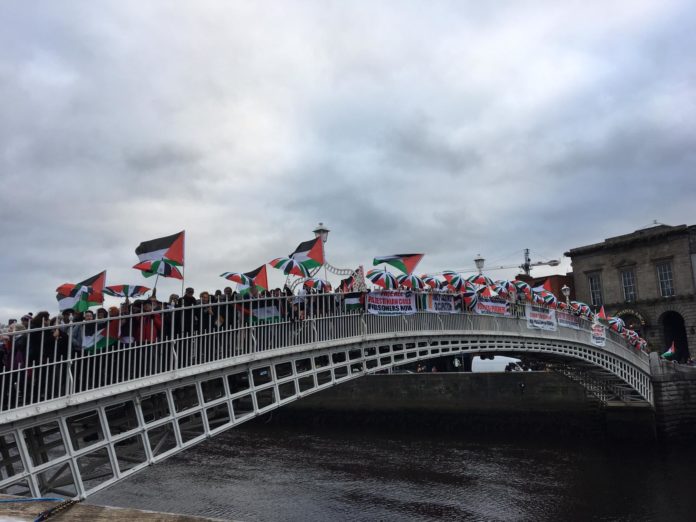It was one of the best academic talks I’ve been at – erudite, passionate and completely gripping. The occasion was a conference we were hosting in Trinity College on academic freedom and Palestine, and the speaker was Dr Steven Salaita. He was speaking in the full knowledge that he’d never work in academia again.
In his talk, Salaita outlined why this was so, speaking about the reasons he was fired from academia (or rather hired and then rapidly un-hired after wealthy donors put pressure on the University of Illinois). In a situation akin to the McCarthyist anti-communist witchhunts of the 1950s, he had been placed on a blacklist because of his criticism of Israel. Ostensibly his case was all about free speech; the University of Illinois un-hired him because they claimed his tweets criticising Israel were un-civil. However as he outlined in his talk, his real crime was political action in that he was a leading campaigner in the successful move to get the American Studies Association to boycott Israel.
Salaita was only one of many academics who have been attacked and censored for criticising Israel – another notorious case has been that of Rabab Abdulhadi. All the usual “defenders of free speech”, those who cry indignantly at censorship, ‘cancel culture’ and who bemoan campuses where intolerant snowflakes impose a reign of terror on the unwoke – it will come as no surprise that they were all silent about these actually existing cases of censorship, blacklisting and silencing. That is, when they did not support them.
While debates around academic freedom are usually framed as left-wing purists seeking to shut down debate and uncomfortable opinions, in reality, academics mostly face pressure from the right. Cancel culture – ensuring there are severe consequences for views deemed unacceptable – has always been a technique used by the powerful. Partly because defenders of Israel are finding it harder to actually defend what Israel is doing to Palestinians, they are increasingly turning to silence opponents.
This quashing of dissenting opinions can be seen as part of Israel’s war on Palestinians. “Price-tag attacks”, vicious attacks on Palestinians in the West Bank has long been a feature of Israeli colonial control – a way of telling Palestinians that there will be a price tag attached to any gesture of defiance. In like fashion, the Israeli think-tank, the Re’ut institute has demanded that those criticising Israel be made to bear a price. The price exacted comes through reputational damage, lawsuits and where possible, through firings.
To this end there has been a weaponisation of the label of antisemitism in order to silence critics of Israel. This can be seen in the furore over the increased usage of the IHRA definition of antisemitism to determine what is and isn’t antisemitic. The problem with the definition – or rather the purpose of the definition – is that it expands the concept of antisemitism to include various attacks on the state of Israel. This has resulted in the absurdity that to say that Israel – a racist state – is a racist state, is now deemed to be antisemitic.
It has been argued that the IHRA definition, by widening the scope of antisemitism to include non-antisemitic acts, makes antisemitism harder to combat. This unfortunate truth has not stopped defenders of Israel eagerly using the IHRA definition to stifle criticism of Israel, and it has been deployed on campuses across the world to threaten students and academics. The IHRA definition is also being used by Israel and its defenders to pressure Facebook to censor criticism of Israel, by allowing them to label critics of Zionists as engaging in hate speech. (More information on the campaign to stop this happening here.)
In universities, the pressure to be silent on Israel/Palestine intersects with the precarious working conditions many academics are placed in. Far from being ivory towers full of gentle contemplation, modern universities offer exploitative, poorly-paid work conditions for the majority of academics. There is a growing number of lecturers and researchers on short-term or piece rate contracts or even paid hourly for their work – an estimated three-quarters of US academics. Their experience is one of isolation, insecurity, exploitation, and fear of speaking out. It’s no surprise that almost all the notorious cases of censorship and silencing involve precarious academic workers being threatened.
However, this pressure has not stopped all academics from speaking out, nor student bodies from organising to support the Palestine struggle for freedom. As organisers of the TCD conference at which Steven Salaita spoke, we wanted to talk both about the threat of censorship and how it has been and can be combatted. Following on from this, we edited a book on academic freedom and Palestine. In it we discuss both the way in which censorship operates, and possible responses to this – from the value or otherwise of deploying the concept of academic freedom, to the need to organise collectively to defend ourselves, our colleagues’ and our students’ right to organise and speak on Palestine.
This Thursday we are launching the book at a webinar. Yara Harawi, Arianne Shahvisi and John Reynolds will be speaking at it and all are welcome.





